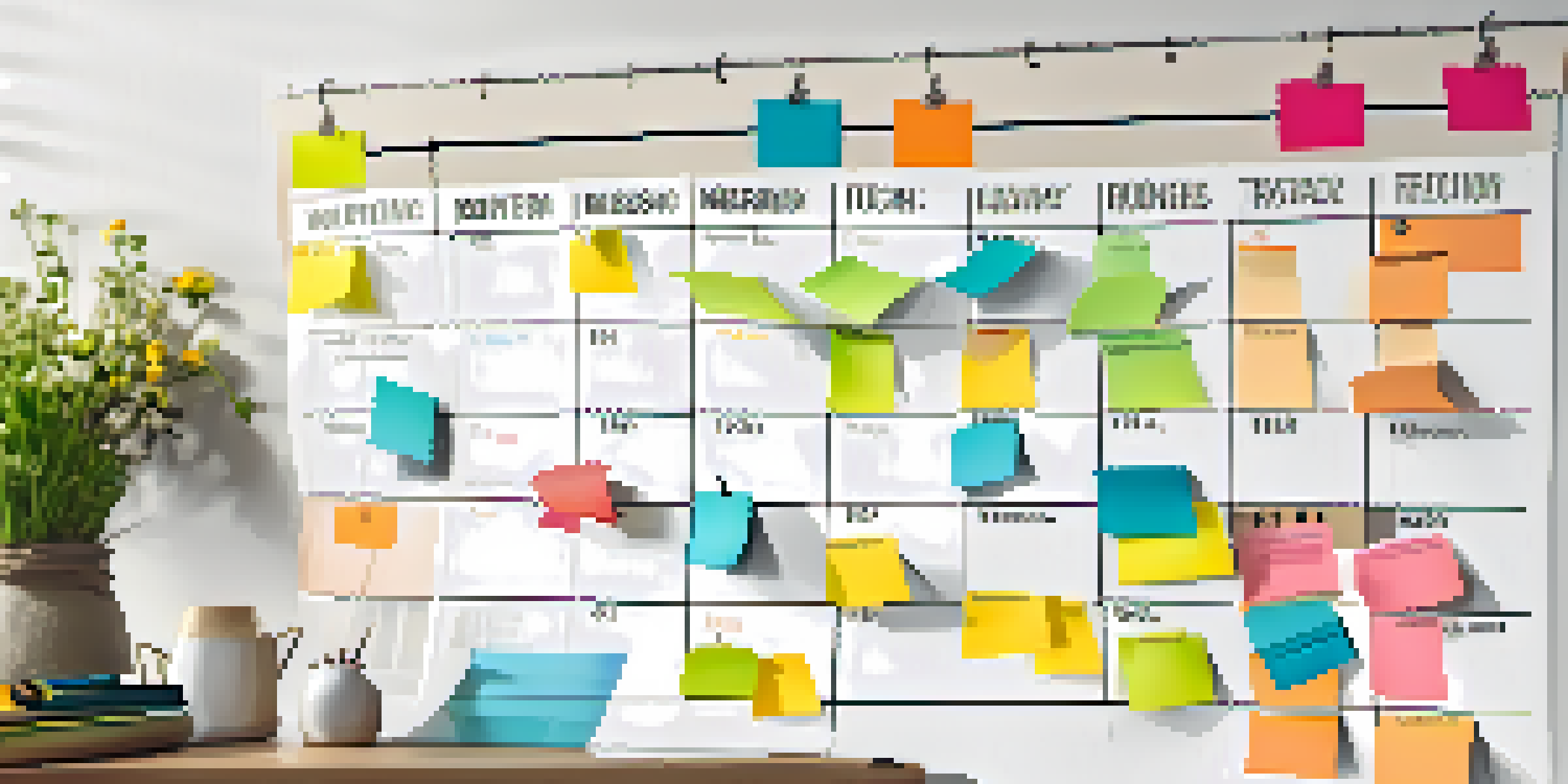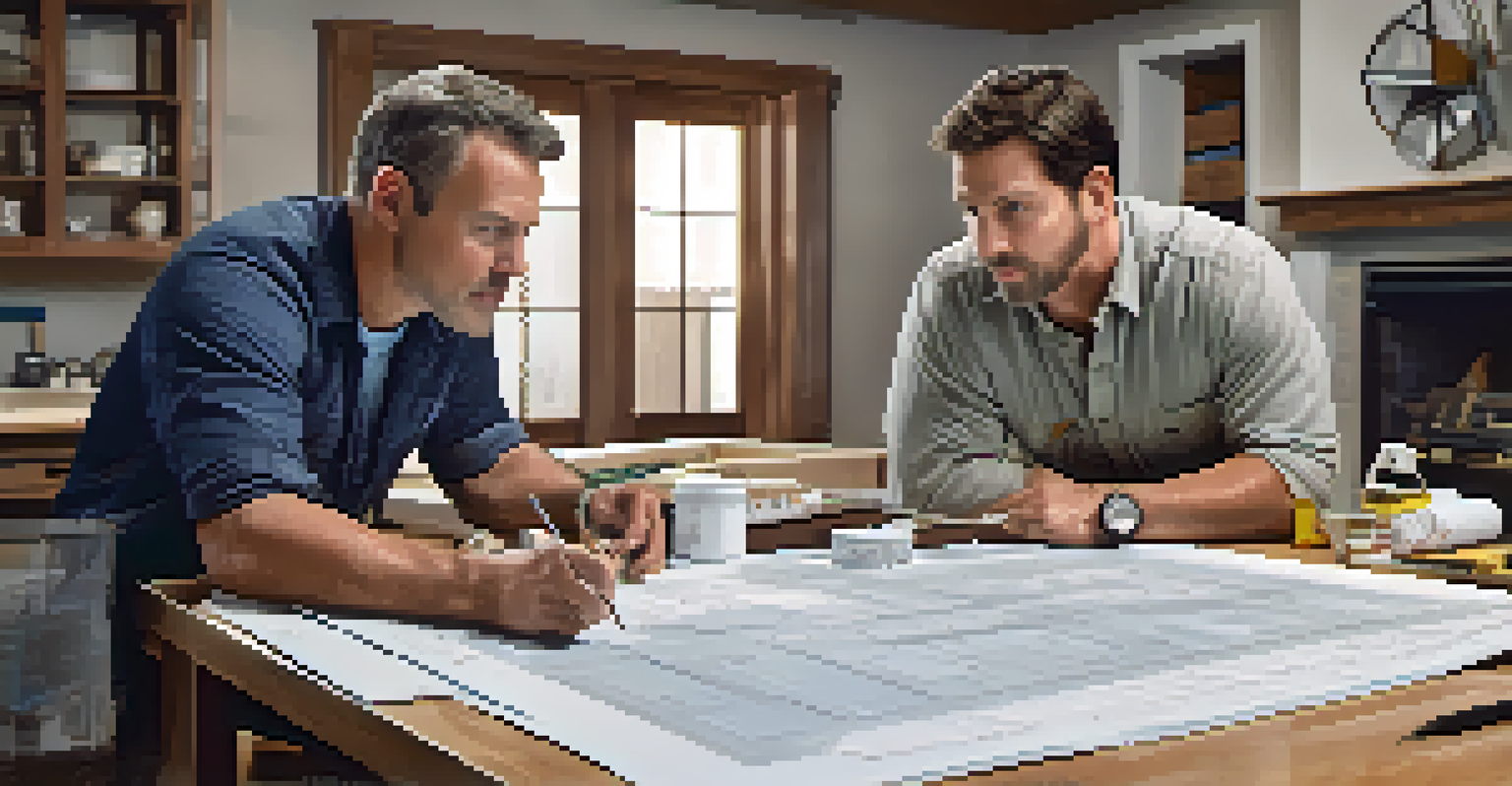How to Successfully Manage a Home Renovation Timeline

Understanding the Importance of a Renovation Timeline
Creating a timeline is crucial for any home renovation project. It provides a structured plan that helps you visualize the entire process, from start to finish. Without a clear timeline, you might find yourself overwhelmed or sidetracked by unexpected challenges.
The secret of getting ahead is getting started.
Moreover, a well-structured timeline can help you stay within your budget. By allocating time for each phase of the renovation, you can better estimate costs and avoid unnecessary expenses due to delays. Think of it as a roadmap guiding you to your destination: without it, you might get lost along the way.
Ultimately, a renovation timeline helps you hold contractors accountable and keeps your project moving forward. Regular check-ins based on your timeline can ensure everyone is on the same page, making the renovation smoother and more efficient.
Setting Realistic Goals and Milestones
Before diving into your renovation, it's essential to set realistic goals and milestones. This means breaking down the overall project into smaller, more manageable tasks. For example, instead of just saying 'renovate the kitchen,' specify tasks like 'install cabinets' or 'paint walls' with target completion dates.

Setting milestones not only makes the project feel more achievable but also allows you to celebrate small wins along the way. This can help keep your motivation high, especially during challenging phases. Remember, every completed task brings you one step closer to your dream home!
Importance of a Renovation Timeline
A clear renovation timeline helps you visualize the process, stay within budget, and hold contractors accountable.
Moreover, make sure your goals align with your budget and timeline. This balance is key to avoiding frustration and ensuring your renovation stays on track. If a goal feels too ambitious, don’t hesitate to adjust it for a more realistic approach.
Creating a Detailed Renovation Schedule
Once you have your goals set, it’s time to create a detailed renovation schedule. This should include specific dates for each task, as well as time estimates for completion. For instance, if you plan to remodel your bathroom, list out each step—demolition, plumbing, tiling, and so on—with an expected start and end date.
Success is the sum of small efforts, repeated day in and day out.
A detailed schedule not only keeps you organized but also ensures that you have all necessary materials and contractors lined up at the right time. It can be helpful to use project management tools or apps to visually track your progress and make adjustments as needed.
Flexibility is important, though; anticipate potential delays and plan accordingly. Having buffer time in your schedule can help mitigate the stress of unforeseen circumstances, like waiting for materials or contractor availability.
Communicating with Contractors and Designers
Effective communication with your contractors and designers is crucial for staying on track with your timeline. Regularly discussing progress, challenges, and changes ensures everyone is aligned and can address issues as they arise. You might even consider weekly check-ins to keep everyone accountable and engaged.
Don't hesitate to voice your concerns or ask questions. If something doesn't feel right or if you’re unsure about a decision, bring it up! Open dialogue fosters a collaborative environment, which can lead to innovative solutions and a smoother renovation process.
Setting Realistic Goals is Key
Breaking down your renovation project into manageable tasks allows for achievable milestones and keeps motivation high.
Remember, your contractors are your partners in this journey. Building a good rapport can lead to better results and even a willingness to go the extra mile to meet your needs.
Managing Unexpected Delays and Issues
No renovation goes perfectly according to plan, so being prepared for unexpected delays is key. Weather changes, supply chain issues, or even permit delays can throw a wrench in your timeline. Instead of panicking, have a backup plan in place to handle these hiccups gracefully.
For instance, if a shipment of tiles is delayed, consider working on another part of the project that doesn't require those tiles. This flexibility can help maintain momentum and keep morale high, as you won't feel like the project is entirely stalled.
Additionally, keep a positive mindset. Remember that every renovation project has its ups and downs, and approaching challenges with a solution-oriented attitude can make all the difference.
Final Inspection and Quality Checks
Once the renovation is nearing completion, conducting a final inspection and quality check is essential. This is your chance to review every aspect of the project and ensure everything meets your expectations and standards. Don’t hesitate to take your time here; it’s better to catch issues now than after moving in.
Make a checklist of everything you want to review, from paint quality to fixture installations. If you notice any concerns, address them with your contractors as soon as possible. They’re usually more than willing to rectify any problems before the project is officially completed.
Communicate for a Smooth Process
Effective communication with contractors and designers fosters collaboration and helps address challenges as they arise.
A thorough final inspection can provide peace of mind, knowing that your newly renovated space is not only beautiful but also safe and functional. It’s the final step in turning your vision into reality!
Enjoying Your Renovated Space and Reflecting
After all the hard work and planning, it’s time to enjoy your newly renovated space! Take a moment to appreciate the transformation and how your vision has come to life. This is the reward for your efforts, and you deserve to soak it all in.
Hosting a small get-together can be a wonderful way to celebrate your new space with friends and family. Sharing your journey and the challenges you overcame can make the experience even more meaningful and enjoyable.

Finally, reflect on the entire renovation process. What went well? What could have been improved? This reflection not only helps you appreciate the completed project but also prepares you for any future renovations, making each one smoother than the last.